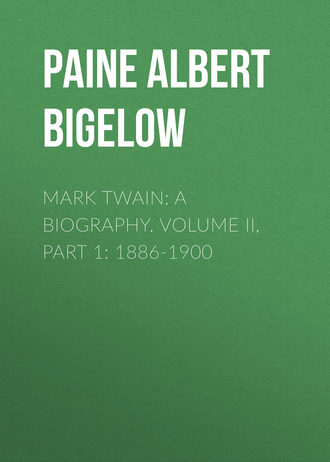
Mark Twain: A Biography. Volume II, Part 1: 1886-1900
DEAR DR. HOLMES,—I shall never be able to tell you the half of how proud you have made me. If I could you would say you were nearly paid for the trouble you took. And then the family: If I could convey the electrical surprise and gratitude and exaltation of the wife and the children last night, when they happened upon that Critic where I had, with artful artlessness, spread it open and retired out of view to see what would happen—well, it was great and fine and beautiful to see, and made me feel as the victor feels when the shouting hosts march by: and if you also could have seen it you would have said the account was squared. For I have brought them up in your company, as in the company of a warm and friendly and beneficent but far-distant sun; and so, for you to do this thing was for the sun to send down out of the skies the miracle of a special ray and transfigure me before their faces. I knew what that poem would be to them; I knew it would raise me up to remote and shining heights in their eyes, to very fellowship with the chambered Nautilus itself, and that from that fellowship they could never more dissociate me while they should live; and so I made sure to be by when the surprise should come.
Charles Dudley Warner is charmed with the poem for its own felicitous sake; and so indeed am I, but more because it has drawn the sting of my fiftieth year; taken away the pain of it, the grief of it, the somehow shame of it, and made me glad and proud it happened.
With reverence and affection,
Sincerely yours,
S. L. CLEMENS.So Samuel Clemens had reached the half-century mark; reached it in what seemed the fullness of success from every viewpoint. If he was not yet the foremost American man of letters, he was at least the most widely known he sat upon the highest mountain-top. Furthermore, it seemed to him that fortune was showering her gifts into his lap. His unfortunate investments were now only as the necessary experiments that had led him to larger successes. As a publisher, he was already the most conspicuous in the world, and he contemplated still larger ventures: a type-setting machine patent, in which he had invested, and now largely controlled, he regarded as the chief invention of the age, absolutely certain to yield incalculable wealth. His connection with the Grant family had associated him with an enterprise looking to the building of a railway from Constantinople to the Persian Gulf. Charles A. Dana, of the Sun, had put him in the way of obtaining for publication the life of the Pope, Leo XIII, officially authorized by the Pope himself, and this he regarded as a certain fortune.
Now that the tide had turned he felt no hesitancy in reckoning a fortune from almost any venture. The Grant book, even on the liberal terms allowed to the author, would yield a net profit of one hundred and fifty thousand dollars to its publishers. Huck Finn would yield fifty thousand dollars more. The sales of his other books had considerably increased. Certainly, at fifty, Mark Twain's fortunes were at flood-tide; buoyant and jubilant, he was floating on the topmost wave. If there were undercurrents and undertow they were down somewhere out of sight. If there were breakers ahead, they were too far distant to be heard. So sure was he of the triumphant consummation of every venture that to a friend at his home one night he said:
"I am frightened at the proportions of my prosperity. It seems to me that whatever I touch turns to gold."
CLIX
THE LIFE OF THE POPE
As Mark Twain in the earlier days of his marriage had temporarily put aside authorship to join in a newspaper venture, so now again literature had dropped into the background, had become an avocation, while financial interests prevailed. There were two chief ventures—the business of Charles L. Webster & Co. and the promotion of the Paige type-setting machine. They were closely identified in fortunes, so closely that in time the very existence of each depended upon the success of the other; yet they were quite distinct, and must be so treated in this story.
The success of the Grant Life had given the Webster business an immense prestige. It was no longer necessary to seek desirable features for publication. They came uninvited. Other war generals preparing their memoirs naturally hoped to appear with their great commander. McClellan's Own Story was arranged for without difficulty. A Genesis of the Civil War, by Gen. Samuel Wylie Crawford, was offered and accepted. General Sheridan's Memoirs were in preparation, and negotiations with Webster & Co. for their appearance were not delayed. Probably neither Webster nor Clemens believed that the sale of any of these books would approach those of the Grant Life, but they expected them to be large, for the Grant book had stimulated the public taste for war literature, and anything bearing the stamp of personal battle experience was considered literary legal-tender.
Moreover, these features, and even the Grant book itself, seemed likely to dwindle in importance by the side of The Life of Pope Leo XIII., who in his old and enfeebled age had consented to the preparation of a memoir, to be published with his sanction and blessing.—[By Bernard O'Reilly, D.D., LL.D. "Written with the Encouragement, Approbation, and Blessings of His Holiness the Pope."]—Clemens and Webster—every one, in fact, who heard of the project—united in the belief that no book, with the exception of the Holy Scripture itself or the Koran, would have a wider acceptance than the biography of the Pope. It was agreed by good judges—and they included Howells and Twichell and even the shrewd general agents throughout the country—that every good Catholic would regard such a book not only as desirable, but as absolutely necessary to his salvation. Howells, recalling Clemens's emotions of this time, writes:
He had no words in which to paint the magnificence of the project or to forecast its colossal success. It would have a currency bounded only by the number of Catholics in Christendom. It would be translated into every language which was anywhere written or printed; it would be circulated literally in every country of the globe.
The formal contract for this great undertaking was signed in Rome in April, 1886, and Webster immediately prepared to go over to consult with his Holiness in person as to certain details, also, no doubt, for the newspaper advertising which must result from such an interview.
It was decided to carry a handsome present to the Pope in the form of a specially made edition of the Grant Memoirs in a rich-casket, and it was Clemens's idea that the binding of the book should be solid gold—this to be done by Tiffany at an estimated cost of about three thousand dollars. In the end, however, the binding was not gold, but the handsomest that could be designed of less precious and more appropriate materials.
Webster sailed toward the end of June, and was warmly received and highly honored in Rome. The great figures of the Grant success had astonished Europe even more than America, where spectacular achievements were more common. That any single publication should pay a profit to author and publisher of six hundred thousand dollars was a thing which belonged with the wonders of Aladdin's garden. It was natural, therefore, that Webster, who had rubbed the magic lamp with this result, who was Mark Twain's partner, and who had now traveled across the seas to confer with the Pope himself, should be received with royal honors. In letters written at the time, Webster relates how he found it necessary to have an imposing carriage and a footman to maintain the dignity of his mission, and how, after various impressive formalities, he was granted a private audience, a very special honor indeed. Webster's letter gives us a picture of his Holiness which is worth preserving.
We—[Mrs. Webster, who, the reader will remember, was Annie Moffett, a daughter of Pamela Clemens, was included in the invitation to the Presence Chamber.]—found ourselves in a room perhaps twenty-five by thirty-five feet; the furniture was gilt, upholstered in light-red silk, and the side-walls were hung with the same material. Against the wall by which we entered and in the middle space was a large gilt throne chair, upholstered in red plush, and upon it sat a man bowed with age; his hair was silvery white and as pure as the driven snow. His head was partly covered with a white skullcap; he was dressed in a long white cassock which reached to his feet, which rested upon a red-plush cushion and were inclosed in red embroidered slippers with a design of a cross. A golden chain was about his neck and suspended by it in his lap was a gold cross set in precious stones. Upon a finger of his right hand was a gold ring with an emerald setting nearly an inch in diameter. His countenance was smiling, and beamed with benevolence. His face at once impressed us as that of a noble, pure man who could not do otherwise than good.
This was the Pope of Rome, and as we advanced, making the three genuflexions prescribed by etiquette, he smiled benignly upon us. We advanced and, kneeling at his feet, kissed the seal upon his ring. He took us each by the hand repeatedly during the audience and made us perfectly at our ease.
They remained as much as half an hour in the Presence; and the Pope conversed on a variety of subjects, including the business failure of General Grant, his last hours, and the great success of his book. The figures seemed to him hardly credible, and when Webster assured him that already a guaranteed sale of one hundred thousand copies of his own biography had been pledged by the agents he seemed even more astonished. "We in Italy cannot comprehend such things," he said. "I know you do great work in America; I know you have done a great and noble work in regard to General Grant's book, but that my Life should have such a sale seems impossible."
He asked about their home, their children, and was in every way the kindly, gentle-hearted man that his pictured face has shown him. Then he gave them his final blessing and the audience closed.
We each again kissed the seal on his ring. As Annie was about to kiss it he suddenly withdrew his hand and said, "And will you, a little Protestant, kiss the Pope's ring?" As he said this, his face was all smiles, and mischief was clearly delineated upon it. He immediately put back his hand and she kissed the ring. We now withdrew, backing out and making three genuflexions as before. Just as we reached the door he called to Dr. O'Reilly, "Now don't praise me too much; tell the truth, tell the truth."
CLX
A GREAT PUBLISHER AT HOME
Men are likely to be spoiled by prosperity, to be made arrogant, even harsh. Success made Samuel Clemens merely elate, more kindly, more humanly generous. Every day almost he wrote to Webster, suggesting some new book or venture, but always considerately, always deferring to suggestions from other points of view. Once, when it seemed to him that matters were not going as well as usual, a visit from Webster showed him that it was because of his own continued absence from the business that he did not understand. Whereupon he wrote:
DEAR CHARLEY,—Good—it's all good news. Everything is on the pleasantest possible basis now, and is going to stay so. I blame myself in not looking in on you oftener in the past—that would have prevented all trouble. I mean to stand to my duty better now.
At another time, realizing the press of responsibility, and that Webster was not entirely well, he sent a warning from Mrs. Clemens against overwork. He added:
Your letter shows that you need such a warning. So I warn you myself to look after that. Overwork killed Mr. Langdon and it can kill you.
Clemens found his own cares greatly multiplied. His connection with the firm was widely known, and many authors sent him their manuscripts or wrote him personal letters concerning them. Furthermore, he was beset by all the cranks and beggars in Christendom. His affairs became so numerous at length that he employed a business agent, F. G. Whitmore, to relieve him of a part of his burden. Whitmore lived close by, and was a good billiard-player. Almost anything from the morning mail served as an excuse to send for Whitmore.
Clemens was fond of affairs when they were going well; he liked the game of business, especially when it was pretentious and showily prosperous. It is probable that he was never more satisfied with his share of fortune than just at this time. Certainly his home life was never happier. Katie Leary, for thirty years in the family service, has set down some impressions of that pleasant period.
Mr. Clemens was a very affectionate father. He seldom left the house at night, but would read to the family, first to the children until bedtime, afterward to Mrs. Clemens. He usually read Browning to her. They were very fond of it. The children played charades a great deal, and he was wonderful at that game and always helped them. They were very fond of private theatricals. Every Saturday of their lives they had a temporary stage put up in the school-room and we all had to help. Gerhardt painted the scenery. They frequently played the balcony scene from "Romeo and Juliet" and several plays they wrote themselves. Now and then we had a big general performance of "The Prince and the Pauper." That would be in the library and the dining-room with the folding-doors open. The place just held eighty-four chairs, and the stage was placed back against the conservatory. The children were crazy about acting and we all enjoyed it as much as they did, especially Mr. Clemens, who was the best actor of all. I had a part, too, and George. I have never known a happier household than theirs was during those years.
Mr. Clemens spent most of his time up in the billiard-room, writing or playing billiards. One day when I went in, and he was shooting the balls around the tables, I noticed smoke coming up from the hearth. I called Patrick, and John O'Neill, the gardener, and we began taking up the hearth to see what was the matter. Mr. Clemens kept on playing billiards right along and paid no attention to what we were doing. Finally, when we got the hearth up, a lot of flame and smoke came out into the room. The house was on fire. Mr. Clemens noticed then what we were about, and went over to the corner where there were some bottle fire-extinguishers. He took one down and threw it into the flames. This put them out a good deal, and he took up his cue, went back to the table, and began to shoot the balls around again as if nothing had happened. Mrs. Clemens came in just then and said, "Why, the house is afire!"
"Yes, I know it," he said, but went on playing.
We had a telephone and it didn't work very well. It annoyed him a good deal and sometimes he'd say:
"I'll tear it out."
One day he tried to call up Mrs. Dr. Tafft. He could not hear plainly and thought he was talking to central. "Send down and take this d–thing out of here," he said; "I'm tired of it." He was mad, and using a good deal of bad language. All at once he heard Mrs. Dr. Tafft say, "Oh, Mr. Clemens, good morning." He said, "Why, Mrs. Tafft, I have just come to the telephone. George, our butler, was here before me and I heard him swearing as I came up. I shall have to talk to him about it."
Mrs. Tafft often told it on him.—[ Mark Twain once wrote to the telephone management: "The time is coming very soon when the telephone will be a perfect instrument, when proximity will no longer be a hindrance to its performance, when, in fact, one will hear a man who is in the next block just as easily and comfortably as he would if that man were in San Francisco."] Mrs. Clemens, before I went there, took care of his desk, but little by little I began to look after it when she was busy at other things. Finally I took care of it altogether, but he didn't know it for a long time. One morning he caught me at it. "What are you doing here?" he asked.
"Dusting, Mr. Clemens," I said.
"You have no business here," he said, very mad.
"I've been doing it for a year, Mr. Clemens," I said. "Mrs. Clemens told me to do it."
After that, when he missed anything—and he missed things often—he would ring for me. "Katie," he would say, "you have lost that manuscript."
"Oh, Mr. Clemens,", I would say, "I am sure I didn't touch it."
"Yes, you did touch it, Katie. You put it in the fire. It is gone."
He would scold then, and fume a great deal. Then he would go over and mark out with his toe on the carpet a line which I was never to cross. "Katie," he would say, "you are never to go nearer to my desk than that line. That is the dead-line." Often after he had scolded me in the morning he would come in in the evening where I was dressing Mrs. Clemens to go out and say, "Katie, I found that manuscript." And I would say, "Mr. Clemens, I felt so bad this morning that I wanted to go away."
He had a pipe-cleaner which he kept on a high shelf. It was an awful old dirty one, and I didn't know that he ever used it. I took it to the balcony which was built out into the woods and threw it away as far as I could throw it. Next day he asked, "Katie, did you see my pipe-cleaner? You did see it; I can tell by your looks."
I said, "Yes, Mr. Clemens, I threw it away."
"Well," he said, "it was worth a thousand dollars," and it seemed so to me, too, before he got done scolding about it.
It is hard not to dwell too long on the home life of this period. One would like to make a long chapter out of those play-acting evenings alone. They remained always fresh in Mark Twain's memory. Once he wrote of them:
We dined as we could, probably with a neighbor, and by quarter to eight in the evening the hickory fire in the hall was pouring a sheet of flame up the chimney, the house was in a drench of gas- light from the ground floor up, the guests were arriving, and there was a babble of hearty greetings, with not a voice in it that was not old and familiar and affectionate; and when the curtain went up we looked out from the stage upon none but faces that were dear to us, none but faces that were lit up with welcome for us.
CLXI
HISTORY: MAINLY BY SUSY
Suzy, in her biography, which she continued through this period, writes:
Mama and I have both been very much troubled of late because papa, since he had been publishing General Grant's books, has seemed to forget his own books and works entirely; and the other evening, as papa and I were promonading up and down the library, he told me that he didn't expect to write but one more book, and then he was ready to give up work altogether, die, or, do anything; he said that he had written more than he had ever expected to, and the only book that he had been pertickularly anxious to write was one locked up in the safe downstairs, not yet published.
The book locked in the safe was Captain Stormfield, and the one he expected to write was A Connecticut Yankee in King Arthur's Court. He had already worked at it in a desultory way during the early months of 1886, and once wrote of it to Webster:
I have begun a book whose scene is laid far back in the twilight of tradition; I have saturated myself with the atmosphere of the day and the subject and got myself into the swing of the work. If I peg away for some weeks without a break I am safe.
But he could not peg away. He had too many irons in the fire for that. Matthew Arnold had criticized General Grant's English, and Clemens immediately put down other things to rush to his hero's defense. He pointed out that in Arnold's criticism there were no less than "two grammatical crimes and more than several examples of very crude and slovenly English," and said:
There is that about the sun which makes us forget his spots, and when we think of General Grant our pulses quicken and his grammar vanishes; we only remember that this is the simple soldier, who, all untaught of the silken phrase-makers, linked words together with an art surpassing the art of the schools, and put into them a something which will still bring to American ears, as long as America shall last, the roll of his vanished drums and the tread of his marching hosts.—[Address to Army and Navy Club. For full text see Appendix]
Clemens worked at the Yankee now and then, and Howells, when some of the chapters were read to him, gave it warm approval and urged its continuance.
Howells was often in Hartford at this time. Webster & Co. were planning to publish The Library of Humor, which Howells and "Charley" Clark had edited several years before, and occasional conferences were desirable. Howells tells us that, after he and Clark had been at great trouble to get the matter logically and chronologically arranged, Clemens pulled it all to pieces and threw it together helter-skelter, declaring that there ought to be no sequence in a book of that sort, any more than in the average reader's mind; and Howells admits that this was probably the truer method in a book made for the diversion rather than the instruction of the reader.
One of the literary diversions of this time was a commentary on a delicious little book by Caroline B. Le Row—English as She Is Taught —being a compilation of genuine answers given to examination questions by pupils in our public schools. Mark Twain was amused by such definitions as: "Aborigines, system of mountains"; "Alias—a good man in the Bible"; "Ammonia—the food of the gods," and so on down the alphabet.
Susy, in her biography, mentions that her father at this is time read to them a little article which he had just written, entitled "Luck," and that they thought it very good. It was a story which Twichell had heard and told to Clemens, who set it down about as it came to him. It was supposed to be true, yet Clemens seemed to think it too improbable for literature and laid it away for a number of years. We shall hear of it again by and by.
From Susy's memoranda we gather that humanity at this time was to be healed of all evils and sorrows through "mind cure."
Papa has been very much interested of late in the "mind-cure" theory. And, in fact, so have we all. A young lady in town has worked wonders by using the "mind cure" upon people; she is constantly busy now curing peoples' diseases in this way—and curing her own, even, which to me seems the most remarkable of all.
A little while past papa was delighted with the knowledge of what he thought the best way of curing a cold, which was by starving it. This starving did work beautifully, and freed him from a great many severe colds. Now he says it wasn't the starving that helped his colds, but the trust in the starving, the "mind cure" connected with the starving.
I shouldn't wonder if we finally became firm believers in "mind cure." The next time papa has a cold I haven't a doubt he will send for Miss Holden, the young lady who is doctoring in the "mind-cure" theory, to cure him of it.
Again, a month later, she writes:
April 19, 1886. Yes, the "mind cure" does seem to be working wonderfully. Papa, who has been using glasses now for more than a year, has laid them off entirely. And my near-sightedness is really getting better. It seems marvelous. When Jean has stomack-ache Clara and I have tried to divert her by telling her to lie on her side and try "mind cure." The novelty of it has made her willing to try it, and then Clara and I would exclaim about how wonderful it was she was getting better. And she would think it realy was finally, and stop crying, to our delight.
The other day mama went into the library and found her lying on the sofa with her back toward the door. She said, "Why, Jean, what's the matter? Don't you feel well?" Jean said that she had a little stomack-ache, and so thought she would lie down. Mama said, "Why don't you try 'mind cure'?" "I am," Jean answered.
Howells and Twichell were invited to try the "mind cure," as were all other friends who happened along. To the end of his days Clemens would always have some panacea to offer to allay human distress. It was a good trait, when all is said, for it had its root in his humanity. The "mind cure" did not provide all the substance of things hoped for, though he always allowed for it a wide efficacy. Once, in later years, commenting on Susy's record, he said:
The mind cannot heal broken bones, and doubtless there are many other physical ills which it cannot heal, but it can greatly help to modify the severities of all of them without exception, and there are mental and nervous ailments which it can wholly heal without the help of physician or surgeon.









